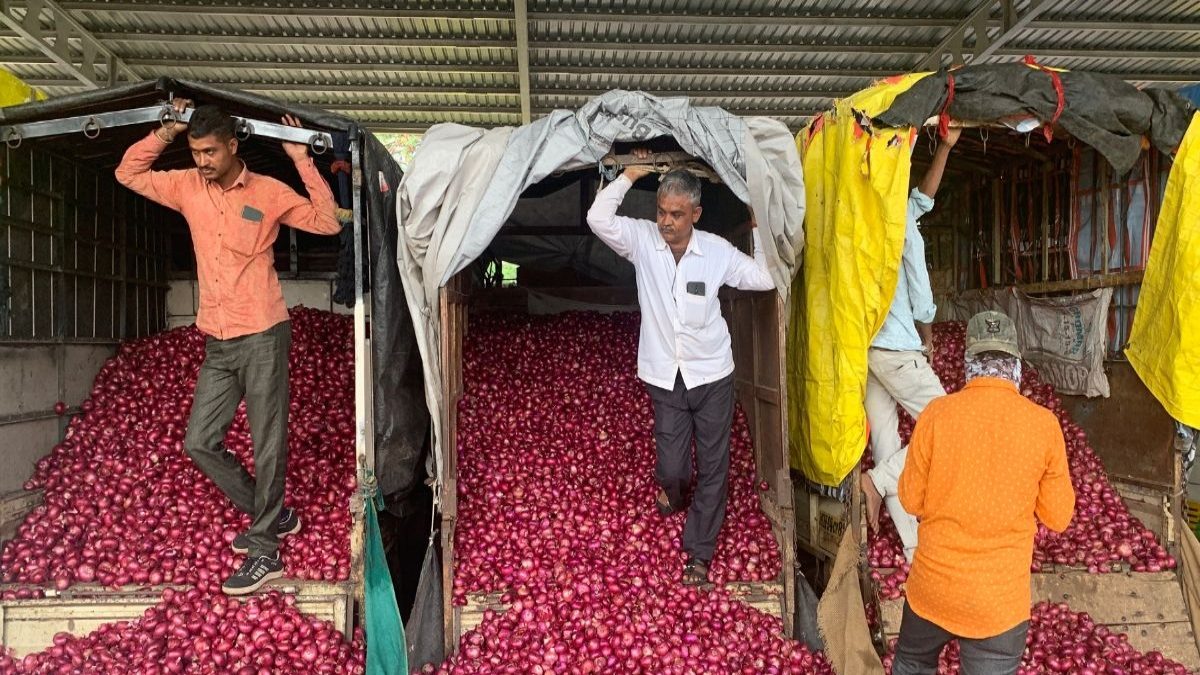Nepal Faces Shortage After India Slaps 40% Tax on Onion Exports: A Deep Dive into the Crisis and Its Repercussions

Nepal Faces Shortage After India Slaps 40% Tax on Onion Exports: A Deep Dive into the Crisis and Its Repercussions
Days after neighbour India imposed a 40% export duty on the vegetable, a media report on Wednesday claimed that Nepal has begun to experience a severe scarcity of onions.
To limit exports of onions till December 31, India last week slapped a 40% tax on those exports. The decision was made in expectation of a price increase before the festival season, when demand for most goods increases, according to The Kathmandu Post newspaper.

As a result of the higher price, numerous vendors at Nepal’s main wholesale market for agricultural goods, Kalimati Fruit and Vegetable Market, reported an unexpected shortage of onions.”Onions are currently extremely scarce in Nepalese marketplaces.
According to Binay Shrestha, information officer for the biggest produce market in the nation, no onion shipments had been sent since Sunday, and the remaining supplies were all gone by Monday. According to Shrestha, onions were selling for Rs 54 per kg two weeks ago, but the retail price has now risen to Rs 100 per kg in the Kathmandu Valley.
The export tariff has caused shortages in the domestic market because Nepal buys practically all of its onion needs from India.According to traders, the shortage begins just as Nepal’s holiday season begins, when onion consumption soars.Unending feasting characterises the festival season, and the fiery bulb is crucial to regional cuisine.”The cost can increase more.
How much, we are unable to say, Shrestha said.”The weekend, which in India is defined as Saturday and Sunday, saw no delivery. The cost of new exports would be increased by 40% due to VAT, he claimed.
The wholesale price of onions at the Kalimati market increased to Rs 78 per kg as a result of the new Indian tax, according to Mohan Baniya, head of the Potato-Onion Import-Export and Wholesaler Association.
The recent move by the Indian government to impose a 40% tax on onion exports has sent shockwaves throughout neighboring Nepal, which heavily depends on India for its onion supply.
The decision, reportedly aimed at controlling domestic inflation and onion prices in India, has had a cascading effect on Nepal’s markets, leading to significant shortages and soaring prices.
Nepal imports a substantial quantity of its onion supply from India, which is one of the world’s largest onion producers. Onion is not just an important cooking ingredient in Nepal but also a staple that has socio-cultural significance. The sudden 40% export tax from India has therefore created a significant supply gap in the Nepali market, making it a pressing concern for both consumers and policymakers.

The most immediate effect has been the steep hike in onion prices in Nepal, causing distress among the consumer populace. The tax, imposed without prior notice, didn’t provide any buffer for market adjustment, leading to instant inflation.
With fears of prolonged shortages, hoarding and black marketing practices have become rampant. This has only exacerbated the crisis, making onions nearly inaccessible for the average consumer.
The food industry, heavily reliant on onions, has been hit hard. Many establishments are either temporarily closing down or revamping their menus to adapt to the crisis, further impacting the already fragile economy.The shortage has led to widespread public anger, sparking protests and calls for immediate government action to solve the crisis.
Onions play a crucial role in Nepali cuisine. The scarcity affects not just daily cooking but also cultural practices, where onions are often used in rituals and traditional dishes.

The unilateral decision by India to impose the tax has been perceived as neglectful of Nepal’s economic interests, thereby straining diplomatic relations. There have been calls for Nepal to diversify its sources for essential commodities to reduce dependence on a single country.
China could potentially step in as an alternative supplier. However, transportation logistics and the quality of Chinese onions, which are different from Indian varieties, present challenges.
One solution could be for Nepal to build a strategic reserve of onions to mitigate such crises in the future.
There’s a renewed focus on diversifying import partners to ensure that Nepal is not overly dependent on India for essential commodities.Boosting local production of onions by providing farmers with incentives, seeds, and know-how is a long-term solution that can provide resilience against such external shocks.

The 40% tax on onion exports by India serves as a wake-up call for Nepal, revealing the vulnerabilities inherent in being overly dependent on a single country for essential goods.
While the crisis has had devastating short-term impacts, it also offers an opportunity for Nepal to reevaluate its trade policies and invest in long-term solutions for self-reliance and food security.
It also serves as a critical reminder for India that its domestic policies can have significant international repercussions, affecting its diplomatic relationships with neighboring countries.

As of now, both nations are engaging in dialogue to address this crisis, but a long-term solution necessitates strategic planning, cooperation, and a commitment to regional stability and mutual growth.



